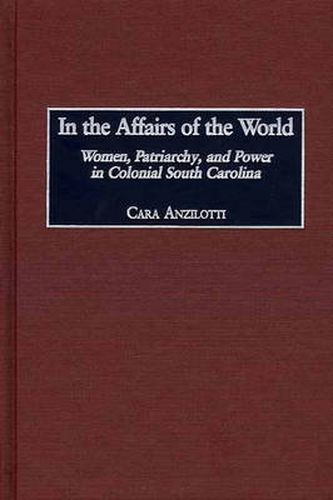Readings Newsletter
Become a Readings Member to make your shopping experience even easier.
Sign in or sign up for free!
You’re not far away from qualifying for FREE standard shipping within Australia
You’ve qualified for FREE standard shipping within Australia
The cart is loading…






Quite by accident and under very unfortunate circumstances, Britain’s colony of South Carolina afforded women an unprecedented opportunity for economic autonomy. Though the colony prospered financially, throughout the colonial period the death rate remained alarmingly high, keeping the white population small. This demographic disruption allowed white women a degree of independence unknown to their peers in most of England’s other mainland colonies, for, as heirs of their male relatives, an unusually large proportion of women controlled substantial amounts of real estate. Their economic independence went unchallenged by their male peers because these women never envisioned themselves as anything more than deputies for their husbands, fathers, brothers, and friends. As far as low country settlers were concerned, allowing women to assume the role of planter was necessary to the creation of a traditional, male-centered society in the colony. Fundamentally conservative, women in South Carolina worked to safeguard the patriarchai social order that the area’s staggering mortality rate threatened to destroy. Critical to the perpetuation of English culture and patriarchal authority in South Carolina, female planters attended to the affairs of the world and helped to preserve English society in a wilderness setting.
$9.00 standard shipping within Australia
FREE standard shipping within Australia for orders over $100.00
Express & International shipping calculated at checkout
Quite by accident and under very unfortunate circumstances, Britain’s colony of South Carolina afforded women an unprecedented opportunity for economic autonomy. Though the colony prospered financially, throughout the colonial period the death rate remained alarmingly high, keeping the white population small. This demographic disruption allowed white women a degree of independence unknown to their peers in most of England’s other mainland colonies, for, as heirs of their male relatives, an unusually large proportion of women controlled substantial amounts of real estate. Their economic independence went unchallenged by their male peers because these women never envisioned themselves as anything more than deputies for their husbands, fathers, brothers, and friends. As far as low country settlers were concerned, allowing women to assume the role of planter was necessary to the creation of a traditional, male-centered society in the colony. Fundamentally conservative, women in South Carolina worked to safeguard the patriarchai social order that the area’s staggering mortality rate threatened to destroy. Critical to the perpetuation of English culture and patriarchal authority in South Carolina, female planters attended to the affairs of the world and helped to preserve English society in a wilderness setting.